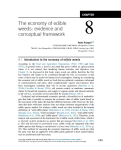Prosperi P. (2024). The economy of edible weeds: evidence and conceptual framework. In : Ebel R. (ed.), Menalled F. (ed.). Agroecology of edible weeds and noncrop plants: ecology and socioeconomic potential of the associated plant biodiversity.
Londres (Royaume-Uni) : Academic Press.
p. 133-148.
Chapter 8.
https://doi.org/10.1016/B978-0-443-16076-9.00009-3
https://doi.org/10.1016/B978-0-443-16076-9.00009-3
| Titre : | The economy of edible weeds: evidence and conceptual framework |
| in : | |
| Auteurs : | P. Prosperi |
| Type de document : | Chapitre d'ouvrage |
| Année de publication : | 2024 |
| Format : | p. 133-148 |
| Note générale : | Chapter 8 |
| Langues : | Anglais |
| Langues du résumé : | Anglais |
| Catégories : |
Catégories principales 07 - ENVIRONNEMENT ; 7.4 - Ressources Naturelles : Paysage, Biodiversité, Patrimoine naturelThésaurus IAMM MAUVAISE HERBE ; ALIMENTATION HUMAINE ; VALEUR ECONOMIQUE ; EVALUATION ; CONSOMMATION ALIMENTAIRE ; PLANTE SAUVAGE |
| Résumé : | Ecological and environmental economics provide a set of methodologies to measure the economic value of edible weeds, based on the assessment of the different trade-offs generated by their ecosystem services. These approaches may provide information on the economic importance of context-specific situations related to the use and consumption of edible weeds and wild edible plants. However, scattered sets of evidence do not provide a pluralistic and articulated view of the interconnected dynamics that regulate the economic importance of the ecosystem services provided within governed social-ecological systems. This chapter develops a new conceptual assessment framework and an optional set of indicators for evaluating the economic importance of edible weeds that integrates the socioeconomic, ecological, and institutional dynamics into the valuation process. |
| Cote : | Réservé lecteur CIHEAM |
| URL / DOI : | https://doi.org/10.1016/B978-0-443-16076-9.00009-3 |







